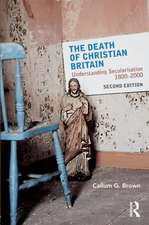The Politics of Madness: The State, Insanity and Society in England, 1845–1914: Routledge Studies in the Social History of Medicine
Autor Joseph Melling, Bill Forsytheen Limba Engleză Paperback – 18 feb 2014
Focusing on the second half of the nineteenth century, The Politics of Madness provides a new perspective on this important topic, based on research drawn from both local and national material. Within a social and cultural history of the English political and class order, it presents a fresh appraisal of the significance of the asylum in the decades following the creation of a national asylum system in 1845.
Arguing that the new asylums provided a meeting place for different social interests and aspirations, the text asserts that this then marked a transition in provincial power relations from the landed interests to the new coalition of professional, commercial and populist groups, which gained control of the public asylums at the end of the period surveyed.
| Toate formatele și edițiile | Preț | Express |
|---|---|---|
| Paperback (1) | 284.11 lei 6-8 săpt. | |
| Taylor & Francis – 18 feb 2014 | 284.11 lei 6-8 săpt. | |
| Hardback (1) | 903.75 lei 6-8 săpt. | |
| Taylor & Francis – 15 mar 2006 | 903.75 lei 6-8 săpt. |
Din seria Routledge Studies in the Social History of Medicine
-
 Preț: 357.13 lei
Preț: 357.13 lei - 8%
 Preț: 389.01 lei
Preț: 389.01 lei - 5%
 Preț: 464.79 lei
Preț: 464.79 lei -
 Preț: 412.03 lei
Preț: 412.03 lei - 5%
 Preț: 460.25 lei
Preț: 460.25 lei - 24%
 Preț: 322.92 lei
Preț: 322.92 lei -
 Preț: 422.04 lei
Preț: 422.04 lei -
 Preț: 436.95 lei
Preț: 436.95 lei -
 Preț: 419.07 lei
Preț: 419.07 lei -
 Preț: 410.66 lei
Preț: 410.66 lei - 18%
 Preț: 285.46 lei
Preț: 285.46 lei -
 Preț: 415.46 lei
Preț: 415.46 lei - 5%
 Preț: 461.14 lei
Preț: 461.14 lei - 5%
 Preț: 392.67 lei
Preț: 392.67 lei - 5%
 Preț: 345.77 lei
Preț: 345.77 lei - 5%
 Preț: 351.53 lei
Preț: 351.53 lei - 5%
 Preț: 414.23 lei
Preț: 414.23 lei -
 Preț: 413.37 lei
Preț: 413.37 lei -
 Preț: 438.27 lei
Preț: 438.27 lei -
 Preț: 469.34 lei
Preț: 469.34 lei - 17%
 Preț: 345.11 lei
Preț: 345.11 lei - 19%
 Preț: 306.68 lei
Preț: 306.68 lei - 5%
 Preț: 261.08 lei
Preț: 261.08 lei - 5%
 Preț: 261.15 lei
Preț: 261.15 lei -
 Preț: 357.24 lei
Preț: 357.24 lei - 25%
 Preț: 769.51 lei
Preț: 769.51 lei -
 Preț: 355.69 lei
Preț: 355.69 lei -
 Preț: 411.42 lei
Preț: 411.42 lei -
 Preț: 416.96 lei
Preț: 416.96 lei - 31%
 Preț: 765.28 lei
Preț: 765.28 lei - 23%
 Preț: 938.70 lei
Preț: 938.70 lei - 28%
 Preț: 737.19 lei
Preț: 737.19 lei
Preț: 284.11 lei
Preț vechi: 348.87 lei
-19% Nou
Puncte Express: 426
Preț estimativ în valută:
54.37€ • 59.04$ • 45.67£
54.37€ • 59.04$ • 45.67£
Carte tipărită la comandă
Livrare economică 22 aprilie-06 mai
Preluare comenzi: 021 569.72.76
Specificații
ISBN-13: 9781138008694
ISBN-10: 1138008699
Pagini: 296
Ilustrații: 48 black & white tables, 5 black & white line drawings
Dimensiuni: 156 x 234 x 18 mm
Greutate: 0.43 kg
Ediția:1
Editura: Taylor & Francis
Colecția Routledge
Seria Routledge Studies in the Social History of Medicine
Locul publicării:Oxford, United Kingdom
ISBN-10: 1138008699
Pagini: 296
Ilustrații: 48 black & white tables, 5 black & white line drawings
Dimensiuni: 156 x 234 x 18 mm
Greutate: 0.43 kg
Ediția:1
Editura: Taylor & Francis
Colecția Routledge
Seria Routledge Studies in the Social History of Medicine
Locul publicării:Oxford, United Kingdom
Public țintă
Postgraduate and ProfessionalCuprins
1 Introduction: The English Asylum and its Historians 2 The Origins of the Asylum 3 The Asylum and the British State in the administration of pauper lunacy, 1845-1914 4 The Ethos of Treatment, Care and Management at the Asylum, 1845-1914 5 Journey to the Asylum: Residence, distance and migration in admissions to the Asylum, 1845-1914 6 Community, Friends and Family: Asylum, Lunatics and the social environment, 1845-1914 7 Reading the Rules of Domesticity: Gender, insanity and the asylum, 1845-1914 8 Madness and the Market: Occupations, class and the asylum, 1845-1914 9 The Patient Experience of the Pauper and Private Asylum 10 From Asylum Inmate to Outpatient: The remaking of the institutional landscape in the Twentieth Century, 1914-1990
Notă biografică
Joseph Melling (University of Exeter, UK) (Author) , Bill Forsythe (University of Exeter, UK) (Author)
Recenzii
'The book is rich in findings founded on a strong evidential base and will be of interest not only to historians of medicine and social policy, but also those of gender, society and politics, as well as to historical geographers and sociologists ... An admirable book that should be a model for further contextualized studies of asylums in particular and regional medical cultures more generally that are needed in Britain and Ireland.' – The Economic History Review
'The book is rich in findings founded on a strong evidential base and will be of interest not only to historians of medicine and social policy, but also those of gender, society and politics, as well as to historical geographers and sociologists ... An admirable book that should be a model for further contextualized studies of asylums in particular and regional medical cultures more generally that are needed in Britain and Ireland.' – The Economic History Review
‘There is no doubt that The Politics of Madness is a major contribution that illuminates both the history of psychiatry and social policy.’ – Journal of the History of Medicine
'The book is rich in findings founded on a strong evidential base and will be of interest not only to historians of medicine and social policy, but also those of gender, society and politics, as well as to historical geographers and sociologists ... An admirable book that should be a model for further contextualized studies of asylums in particular and regional medical cultures more generally that are needed in Britain and Ireland.' – The Economic History Review
‘There is no doubt that The Politics of Madness is a major contribution that illuminates both the history of psychiatry and social policy.’ – Journal of the History of Medicine
Descriere
Within a social and cultural history of the English political and class order, this text presents a fresh appraisal of the significance of the asylum in the decades following the creation of a national asylum system in 1845.













